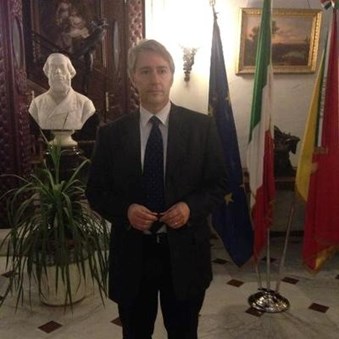17 June 2021
Hearing of Antonio La Ferrara, President of Futurlab

Civil Servant at the Presidency of the Council of Ministers and freelance journalist. He deals with external relations and EU policies, for 17 years as head of a European documentation centre. He collaborates with the Max Weber Institute. In the field of training, he served for 24 years at the Scuola Nazionale dell'Amministrazione –SNA (Italy’s public administration school), after short experiences at the Ufficio Provinciale del Lavoro e della Massima Occupazione in Verona and at the Press Office of the Minister for Civil Protection.
Hearing summary
On 17 June 2021, the hearing of Antonio La Ferrara, President of the “FuturLab – Costruiamo il futuro” social promotion association, took place. The FuturLab Association has distinguished itself for the information and training activities carried out since its foundation in 2015, for the work performed with the School of political training for the common good, and plans to soon start another activity to create a virtuous circle among the actors of the territory, namely economic operators, institutions and intermediate bodies.
During the meeting, President La Ferrara pointed out the need for the Conference on the Future of Europe to involve third sector organisations in order to understand the need to promote the social economy as an engine for the future of the Old Continent. He stated that legal regulation of the third sector and non-profit organisations is essential in the EU, since no specific regulation currently applies. He called for greater participation of third sector entities in European calls for proposals and for a harmonised tax system at EU level; it is essential that European institutions establish tax measures that recognise and enhance the social impact of the activities carried out by third sector entities. Furthermore, it is necessary to rethink the economic model by promoting and supporting the idea of sustainable development, changing the heart of the economy, networking among stakeholders, public administrations, credit institutions, economic operators and above all intermediate bodies, citizens, families and associations through the affirmation of the principle of horizontal subsidiarity enshrined in our Constitutional Charter. Strengthening the Social Pillar (European pillar of social rights signed in 2017 at the Gothenburg Summit) is also of primary importance. The Pillar lays down 20 fundamental principles that should guide us towards a strong and fair social Europe. Moreover, it is necessary to follow up on the agreement concluded (on 7 May 2021 in Porto) between European leaders in which all European partners made a commitment to achieve the social objectives for 2030 and implement the Social Economy Action Plan.
Unfortunately, in the past, EU policy often spoke of social impact investments, delegating to the private sector and to philanthropic expectations the task of driving the financial engine to achieve social innovation; on the contrary, now is the time for our Government to accelerate and guarantee third sector entities – including within the EU – advantageous taxation, as these entities often replace public bodies or in any case support and complement the activities of institutions in their shortcomings and in responding to social needs. Strong government action combined with support from the third sector can ensure that the declarations of intent produced in recent years, and specifically in recent months with several European-level events (Porto, 7 May 2021), or that will be produced with future events already on the agenda (European Social Economy Summit, 26-27 May 2021 in Mannheim) do not remain merely exhortatory but are translated into concrete facts.
The FuturLab Association proposes to include, within the programme of the third year of the School of political training, a day to be organised with the Department of European Policies and LUP (Free University of Politics) dedicated to the Conference on the Future of Europe, to be opened to Sicilian civil society to listen to proposals, ideas and suggestions. The same initiative can be replicated in Rome where FuturLab is also present.
